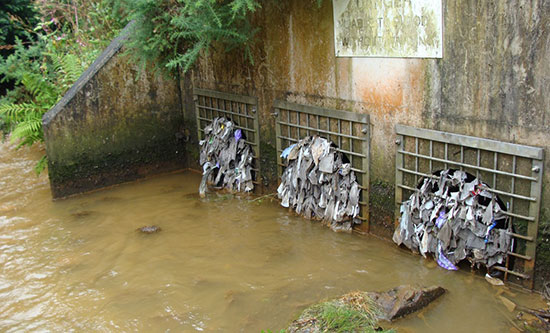
In mid-August, several beaches across England and Wales received pollution warnings after heavy rainfall overwhelmed sewerage systems, requiring the discharge of untreated sewage into the sea. Water companies such as Southern Water claim these discharges are required to protect homes and businesses but these events continue to occur after years of illegal raw sewage dumping and clamour to fix Britain’s water infrastructure. Despite the disgust demonstrated by both British citizens and England’s neighbouring countries, the Conservative government has done nothing to hold the private water companies accountable to health and environmental standards, and instead has actively worked make life easier for the polluting and profiteering companies.
The majority of Britain has a sewerage system that combines rainwater and wastewater (from toilets, bathrooms, and kitchens), carried in the same pipe systems. In normal weather, this wastewater is taken to sewage treatment plants but in bad weather, when the system is overwhelmed with storm water, the Environment Agency (EA) allows water companies to discharge excess wastewater into the sea and rivers through 15,000 overflows. These discharges are meant to be occasional occurrences but recent data shows that water companies pumped raw sewage into rivers and seas 375,000 times in 2021 alone, many of these outside of heavy rainfall events. Furthermore, research by the Liberal Democrats reveals that, in some cases, up to 50% of the reported raw sewage monitoring devices used by water companies to detect wastewater discharges were faulty or non-existent. Due to a lack of monitoring, a quarter of all sewage discharges went unmonitored in 2021.
The problem has become large enough in scale that it has drawn the attention of other EU countries. Three French Members of the European Parliament (MEP) have come forward accusing the UK of harming marine life health on the French coast by allowing its water companies to dump raw sewage into the Channel and the North Sea. The MEPs argue that Britain should still be held accountable to UN standards on shared water protections and to water quality commitments made under Brexit. These standards are important as wastewater is not only a danger to those who wish to take a swim. Aside from human waste, raw sewage can carry microplastics, endocrine disruptors that can interfere with hormones, phosphorus which can encourage lethal algal blooms, and antibiotic-resistant bacteria. Each of these components can have multiplying impacts on the surrounding marine ecosystem, which we rely on not only to provide food but also for environmental stability. Raw sewage discharges are expected to only increase in frequency if the current system remains unchanged as climate change multiplies the chance of freak storms and a larger population places higher stress on the sewerage system.
None of this should come as a surprise, given the Conservative government’s track record of purposeful deregulation. In October 2021, an attempt to place legal duties on water companies to reduce discharge in the Environment Act was defeated by 265 Conservative MPs’ votes. The Storm Overflows Discharge Reduction Plan published by the government in August 2022 in an attempt to head off criticism, will only provide a meagre £56bn investment in targeted improvement to storm overflow discharges; much of this is slated to come from future water bills, while water company executives walk away with multi-million pound bonuses.
Over 70% of England’s water industry is owned by companies based overseas in places like Malaysia, the Cayman Islands, the US, Germany, UAE, Kuwait, China, and Australia. Since English water companies were privatised in 1989, an average of £2bn a year has been handed to shareholders of these companies instead of invested into improving infrastructure. Furthermore, although there were debt write-offs when then Prime Minister Margaret Thatcher transferred water to into private hands, in the three decades since then, water companies have had to borrow over £48bn – not to improve infrastructure but to pay dividends to shareholders. This grossly inefficient use of money is compounded by directors’ salaries that average out in the multiples of million pounds. As is made obvious by these decisions, these water companies only have an interest in making profits off of a resource needed for survival. There can be no hope for a proper water system when the government has purposefully neglected the issue and shareholders prioritise profit at the expense of the environment.
Aside from the financial mismanagement of the English water system, the government’s plan does little to consider the resilience of a broken sewerage system in the face of snowballing climate impacts. In some areas of England and especially in London, the system is already at the point that drizzle can cause pipe overflow. With further urbanisation comes more concrete in the form of houses and roads, decreasing the surface area that can naturally absorb rain, furthering stress on England’s water pipes. In London, projects like the £4.2bn Tideway super sewer are underway to tackle sewage overflow but projects like these cost huge amounts of money and require the use of concrete that comes with its own exorbitant carbon costs. These barriers mean super sewers and other types of grey infrastructure are not a scalable solution for the rest of England. A better option is green infrastructure that uses wetlands, ponds, and green ditches along with green roofs and rainwater-harvesting systems to prevent rainwater from reaching sewers in the first place. Green infrastructure pays off in the long term with less overflow and greater biodiversity but requires maintenance, implying a need for cohesive, long term, centralised strategy.
A government that allows the continued dumping of raw sewage into public waterways and refuses to rein in water companies’ profits at the expense of the environment and the health of the people, will never be able to deliver effective water infrastructure. We deserve a nationalised water system, which is run to serve the people and planet, not to make a profit.
Soma Kisan




